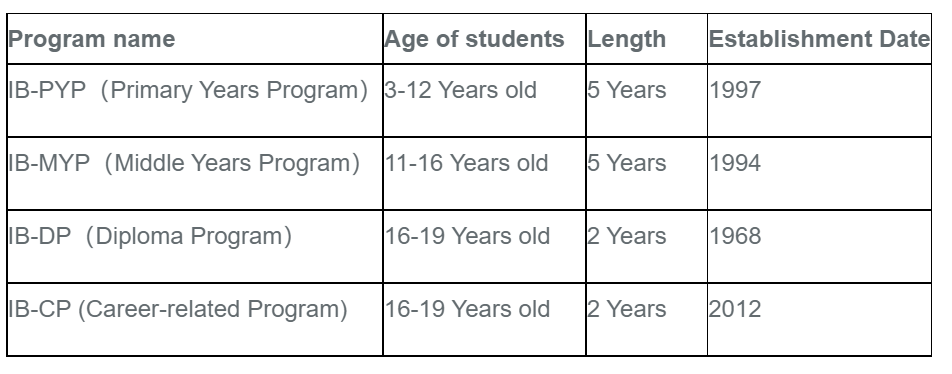IBO: The International Baccalaureate Organization (IBO) is established in 1968. The organization is a non-profit international education foundation registered by the United Nations Educational, Scientific and Cultural Organization (UNESCO) and recognized as a world leader in international education.
There are 4 curricula under IB, which are: IB-PYP program, IB-MYP program, IB-DP program and IB-CP program.

IB-PYP (Primary school):
IB-PYP focuses on cultivating children to be all-round developed explorers both inside and out of the classroom. The program covers 3 to 12-year-old students and consists of six interdisciplinary themes. Students can explore the world and engage in inquiry-based learning by using the knowledge and skills acquired from six disciplines.
6 Transdisciplinary Themes are:
· Who we are
· Where we are in place and time
· How we express ourselves
· How the World works
· How we organize ourselves
· Sharing the Planet
6 subject areas are:
Language, Social studies, Mathematics, Science, arts and personal, social & physical education
The fundamental goal of PYP program is for the student to gain basic knowledge and skills, develop understanding of important concepts, form a positive attitude and take responsible actions. This is also called “Five essential elements”.
Five essential elements:
· Knowledge: To have a comprehensive understanding of ideas, not merely acquisition facts and skills.
· Concepts: What we want students to understand? (Shape, function, cause and effect, change, connection, perspective, responsibility, reflection).
· Skills: What we want students to be able to do? (Think, communicate, socialize, research, self-management).
· Attitudes: What we want students to feel, to cherish and to express? (Tolerance, respect, integrity, independence, enthusiasm, resonance, curiosity, creation, cooperation, confidence, devotion, gratitude).
· Action: How we want students to act? (reflect, choose, act).
The course setting of the PYP program meets the requirements for most of the international and regional indigenous curriculum well, and lays foundation for the study of the MYP courses.
IB-MYP (Middle school):
IB-PYP program is for students aged 11 to 16, and aims to cultivating them to be creative, critical and reflective thinkers. The course setting of the MYP program meets the requirements for most of the international and regional indigenous curriculum well, and acts as an excellent bridge between IB-PYP and IB-DP courses.
MYP curriculum includes Eight Academic Areas (subject groups) surrounding the Five Areas of Interaction and the Personal Project at the end of the program.
Eight Academic Areas are:
Language A, Language B, Humanities, Sciences, Mathematics, Arts, Physical education and Technology.
Five Areas of Interaction refers to:
· Approaches to learning: Developing students’ critical thinking skills, systematic independent thinking skills as well as problem solving and decision-making skills through the learning of knowledge in different subjects, attitude to learning, study skills and methods.
· Community and service: Emphasizes students' sense of community and responsibility as well as develop their skills and attitudes of contributing to the society.
· Human ingenuity: Attach importance to students’ innovation, innovation process and consideration of the impact of human creation on society and human thoughts. Encourage students to explore the relationship between science, art, technology and ethics.
· Environments: Allow students to understand the interdependence between people and the environment, so that they will know their responsibilities and take positive and responsible actions to protect the environment.
· Health and social education: Let students grow up healthy both physically and mentally, so as to improve their sense of responsibility for themselves and their living environment.
Personal Project:
In the five-year middle school program, all students are expected to complete the Personal Project, and finish the main work in the last academic year of the Middle Years Program, requiring students to spend about 25 hours to develop their Personal Project. Students who have successfully completed the Project will be qualified to receive the course results and awarded a diploma for MYP program.
IB-DP (University foundation program):
IB-DP is the oldest program in the entire IB Continuum, it is mainly for 16 to19-year-old students and function as a high school diploma course/university foundation course. The whole course runs two years, which is equivalent to senior high school year two and three in China. After completing the DP stage, students can progress to study at a University.
IB Diploma course consists of six academic areas and three core requirements.
Six Academic Areas are:
Group 1: Studies in language and literature – Language A (Native language)
Group 2: Language acquisition – Language B (A language other than the student’s native language)
Group 3: Individuals and societies (History, Geography, Economics, Philosophy and Psychology etc.)
Group 4: Experimental sciences (Physics, Chemistry, Biology and Environmental System etc.)
Group 5: Mathematics (Math standard level, Math higher level and Math studies etc.)
Group 6: The Arts (Music, Art design, Visual art and drama etc.)
Three Core Requirements
To obtain the IBDP diploma, students are required to meet the three core requirements: complete the Theory of Knowledge (TOK) course, submit the Extended Essay (EE), and engage in Creativity, Action, Service (CAS) activities and obtain 150 qualified hours.
IB-CP (Career planning program)
Added in 2012, IB CP (career related program) is a new program created by IBO, which is specially designed for 16-19-year-old students who want to carry out career related learning. This provides students who eventually did not get their IB Diploma an alternative choice.
The framework of this project consists of three parts: (1) selection of at least two courses from IBDP program; (2) vocational planning learning (professional language for different professions and technologies around the world); (3) IBCC core (incl. approaches to learning (ATL) course, community and service, a reflective project and language development).
Because IB-CP is only created recently, there are relatively few schools worldwide that offer this course. Up to Dec 2019, there are 254 schools globally that opens IB-CP program, among those schools, China has 2. The 2 Chinese schools are: Shanghai Singapore International School and Western International School of Shanghai.
